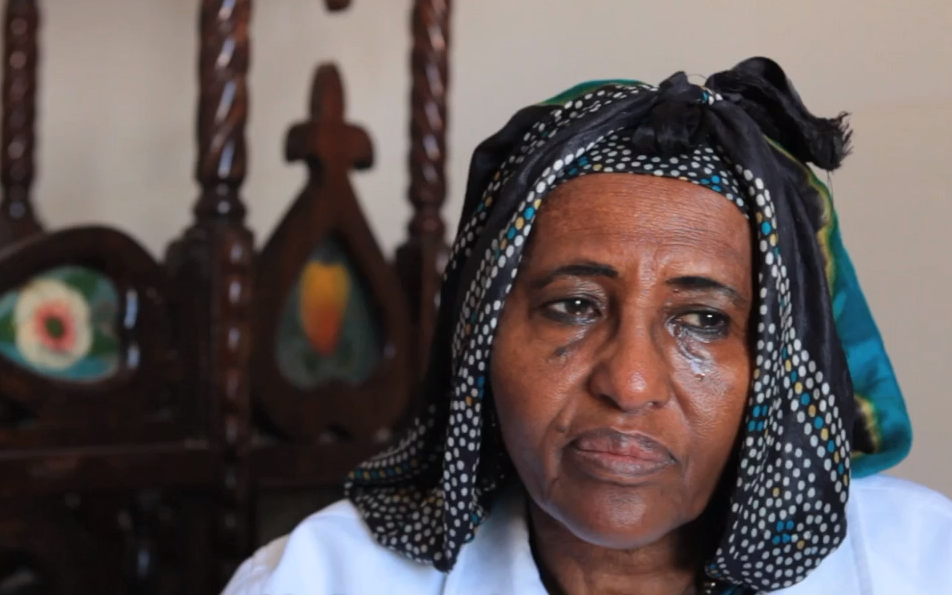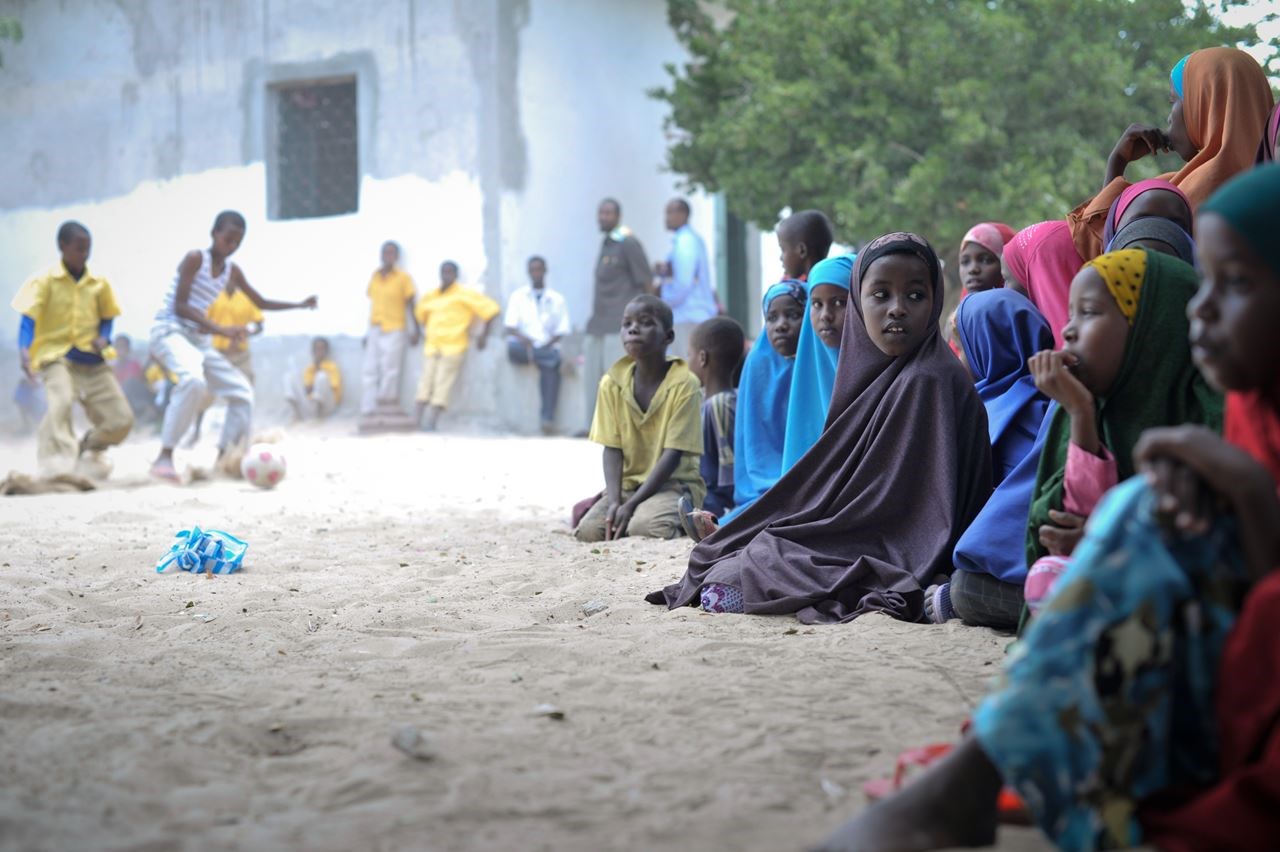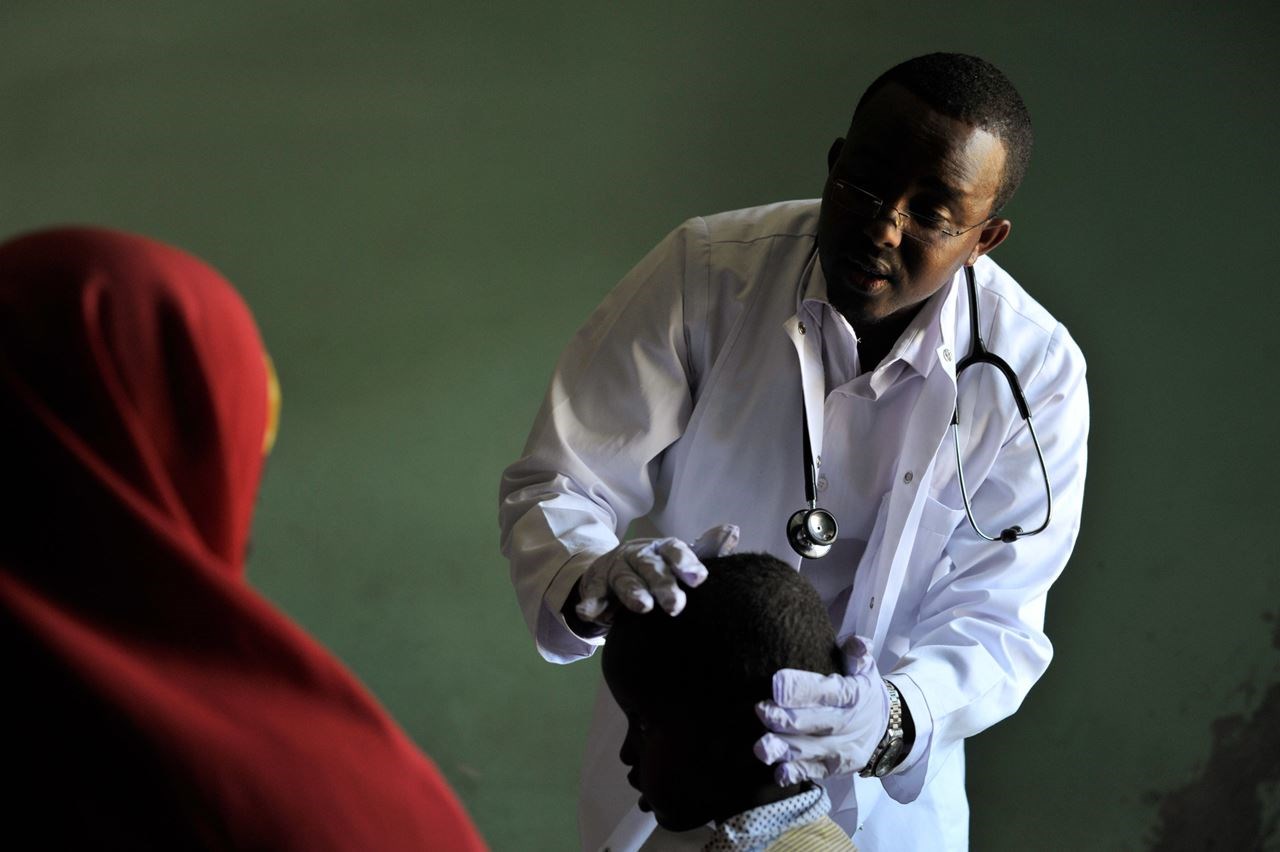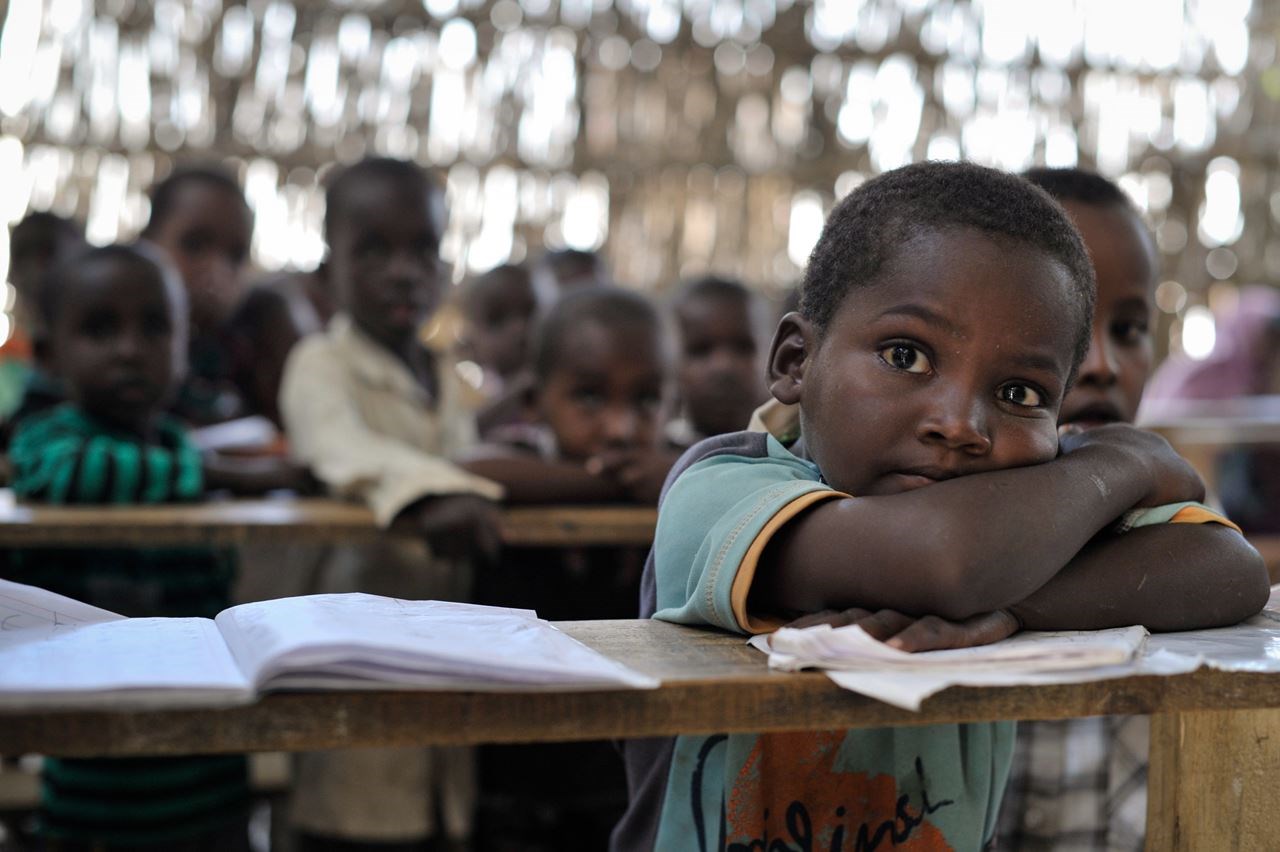Click to watch the Dan Eldon Activist Award-winning film Vital Voices: Hawa Abdi. Produced by Aaron Kisner, this film is about Dr. Hawa Abdi, Somalia's first female gynecologist. When the central government collapsed in 1989, Dr. Abdi's one-room clinic on her family farm began treating and housing local people fleeing the fighting.
 Dr. Hawa Abdi in a 2012 interviewVia Wikimedia CC BY SA 2.0 [public domain]“Perhaps we love origin stories… because they ‘show the exact moment when a normal guy goes from being just like us to being somehow better, faster, stronger.’” In his article “The Psychology Behind Superhero Origin Stories,” Robin Rosenberg asserts that in movies, the lives of superheroes and the viewers are made to be similar in order to forge an empathetic connection between the viewer and what they are seeing. Superheroes often have modest beginnings, endure hardship, and try to act with benevolence as regular humans do. However, unlike superheroes, there are people in our world who persist through struggles and act heroically without the elements of a fantasy world aiding them. These are our real heroes. Real heroes may not wear spandex, but they definitely share one thing with superheroes: a drive to do good in the world. Human nature is to want to help others and elevate their lives. A person is a hero when he or she acts on this impulse; in doing so, the person brings a little more goodness into the world. Heroes, super or not, do not need to be rich, popular, or uniquely talented; they can just be simple people who try their best to help others. In trying to improve the world, heroes often exemplify certain traits. They have compassion for the problems of others, which creates motivation to help those in need. The drive of a hero to impact society is then magnified by their determination to help others. Through empathy and understanding of society’s problems, heroes are able to motivate themselves to strive for a better world.
Dr. Hawa Abdi in a 2012 interviewVia Wikimedia CC BY SA 2.0 [public domain]“Perhaps we love origin stories… because they ‘show the exact moment when a normal guy goes from being just like us to being somehow better, faster, stronger.’” In his article “The Psychology Behind Superhero Origin Stories,” Robin Rosenberg asserts that in movies, the lives of superheroes and the viewers are made to be similar in order to forge an empathetic connection between the viewer and what they are seeing. Superheroes often have modest beginnings, endure hardship, and try to act with benevolence as regular humans do. However, unlike superheroes, there are people in our world who persist through struggles and act heroically without the elements of a fantasy world aiding them. These are our real heroes. Real heroes may not wear spandex, but they definitely share one thing with superheroes: a drive to do good in the world. Human nature is to want to help others and elevate their lives. A person is a hero when he or she acts on this impulse; in doing so, the person brings a little more goodness into the world. Heroes, super or not, do not need to be rich, popular, or uniquely talented; they can just be simple people who try their best to help others. In trying to improve the world, heroes often exemplify certain traits. They have compassion for the problems of others, which creates motivation to help those in need. The drive of a hero to impact society is then magnified by their determination to help others. Through empathy and understanding of society’s problems, heroes are able to motivate themselves to strive for a better world.
 Dr. Hawa's center in the Afgoye corridorVia Wikimedia CC BY 2.0 [public domain]Dr. Hawa Abdi is an example of an ordinary person who constantly shows a commitment to kindness, and this pushed her into a life of heroism. Abdi was born in Mogadishu, Somalia, in 1947. She had a peaceful childhood until her mother died from a problematic pregnancy in 1959. The traumatic experience of losing her mother led Abdi to search for answers and pursue a career as a doctor. In 1991, after Abdi opened up her own private practice, the Somali government collapsed, throwing the country into a civil war. Refugees and the injured sought out Abdi’s small, roadside hospital for shelter and medical help. Dr. Abdi opened her clinic to whomever could make it there, and her hospital soon grew into a massive safe haven for the injured and homeless. Dr. Hawa Abdi pushed through confusion, terror, and hardship to become a leader for the powerless. She eventually housed more than 90,000 refugees on her land, now called Hope Village. After many years, the overwhelming responsibility resting on her shoulders took a toll, leaving Abdi tired, depressed, and faltering in hope. Nevertheless, Abdi’s sense of duty allowed her to persist, and she still takes care of the refugees to this day. When met with an immeasurably intimidating responsibility such as the one Dr. Abdi faced, a real hero would take the challenge. A real hero would be able to identify the struggles of the vulnerable, and a real hero would find it within themselves to help those in need. To do this, a hero must have the empathy to comprehend why their mission is so important, and he or she must have the determination to persevere through inevitable hardships. Therefore, Dr. Abdi is heroic since she took up the challenge of saving as many people as she could while exemplifying the heroic traits of compassion and dedication. Through her compassion for the hardships of others and her unwavering devotion in the face of adversity, Dr. Hawa Abdi represents the ideals of a true hero.
Dr. Hawa's center in the Afgoye corridorVia Wikimedia CC BY 2.0 [public domain]Dr. Hawa Abdi is an example of an ordinary person who constantly shows a commitment to kindness, and this pushed her into a life of heroism. Abdi was born in Mogadishu, Somalia, in 1947. She had a peaceful childhood until her mother died from a problematic pregnancy in 1959. The traumatic experience of losing her mother led Abdi to search for answers and pursue a career as a doctor. In 1991, after Abdi opened up her own private practice, the Somali government collapsed, throwing the country into a civil war. Refugees and the injured sought out Abdi’s small, roadside hospital for shelter and medical help. Dr. Abdi opened her clinic to whomever could make it there, and her hospital soon grew into a massive safe haven for the injured and homeless. Dr. Hawa Abdi pushed through confusion, terror, and hardship to become a leader for the powerless. She eventually housed more than 90,000 refugees on her land, now called Hope Village. After many years, the overwhelming responsibility resting on her shoulders took a toll, leaving Abdi tired, depressed, and faltering in hope. Nevertheless, Abdi’s sense of duty allowed her to persist, and she still takes care of the refugees to this day. When met with an immeasurably intimidating responsibility such as the one Dr. Abdi faced, a real hero would take the challenge. A real hero would be able to identify the struggles of the vulnerable, and a real hero would find it within themselves to help those in need. To do this, a hero must have the empathy to comprehend why their mission is so important, and he or she must have the determination to persevere through inevitable hardships. Therefore, Dr. Abdi is heroic since she took up the challenge of saving as many people as she could while exemplifying the heroic traits of compassion and dedication. Through her compassion for the hardships of others and her unwavering devotion in the face of adversity, Dr. Hawa Abdi represents the ideals of a true hero.
Dr. Abdi’s compassion for others compelled her to redirect her life and career to support those in need and ultimately endure incredible hardship for the protection of her people. Abdi’s mother’s death left her devastated, but as she grew older, she found meaning from the tragedy: “Whether it comes to us through violence, disease, or even childbirth, death is not the end of our story. You have to get up and help someone who needs you. I became a doctor because I wanted to save others from feeling the pain I felt when my mother died” (“Vital Voices Global Leadership Awards” 00:00:25-47). Her mother’s death gave Abdi a cruel glimpse into the pain of losing a loved one, which helped her develop empathy for people going through similar situations. This empathy drove Abdi’s motivations. Since she understood the pain of loss, the urge to stop that pain grew more intense. Abdi's empathy was not only the catalyst that drove her to become a doctor, but also the motivation that drove her to pursue extraordinary feats, such as creating the refugee camp. Abdi’s devotion created from that compassion allowed her to deal with the responsibility of caring for ninety thousand frightened people. It allowed her to persist through extreme exhaustion, anxiety, and at times, depression in order to save her people. Abdi’s ability to turn compassion into action makes her a hero because her mission to fix pain is strengthened by the motivation to stop it. As a female doctor, Abdi often went to the homes of pregnant women to perform checkups and help deliver babies. During these trips, she realized that the women needed a professional clinic to give birth in, not unequipped houses. Abdi realized that women in poverty would not be able to stay in a larger health establishment, but she figured out another way to help them: “What if, in the clearing near our home, I built a one-room clinic? Many pregnant women from the villages could travel the few kilometers to our place in the middle of the night… I couldn't save them all, but I could do something” (Abdi 53). Abdi's reaction to the villagers in need shows she has compassion, as she understood that they did not just need a hospital and medical care, but medical assistance that was accessible and logical for their lifestyle. Dr. Abdi’s reaction to the needs of pregnant women demonstrates how her compassion drives her to alter her life in order to provide for others. Her compassion for their struggles compels her to open her home to them and help even a few people through tough times. Whether for poor mothers or refugees, Abdi will consistently sacrifice her life, her property, and her well being for others. Dr. Hawa Abdi has empathy for the struggles of her patients, which motivates her to pursue her work while selflessly surrendering what her people need of her.
 Medical help at the centerAIMSOM via Flickr CC BY SA 2.0 [public domain]Dr. Hawa Abdi faced many challenges, but she retained a stubborn dedication to her ethics and her mission to help others, allowing her to stand with her commitments and develop the courage and selflessness to navigate overwhelming resistance. One morning in 2010, a militia filled with young men approached Abdi’s hospital-turned-refugee-camp and demanded that they surrender the hospital’s goods. They told Abdi that because she was old and a woman, the men deserved her hospital more. But, Abdi held her ground: “I knew that these invaders, with their guns and their religion, were motivated solely by owning and taking, but in my anger, I would stand firm. My Islam sees women as valued members of society - as equals - so I never showed my despair” (Abdi xii). Abdi was old, frail, and unequipped to fight back against an armed militia, but she resisted their bullying. She showed dedication to her patients, as she would not relinquish the supplies they needed. In the same way, she showed dedication to her beliefs of female equality as she did not back down from the Somalian men, even though that was expected in their society. Abdi’s dedication solidified her resolve and gave her the courage to stand up to her oppressors rather than avoid the confrontation by submitting to what they wanted. It allowed her to be fearless when faced with the terrifying prospect of pain and violence and remain loyal to protecting and providing for those reliant on her. Abdi’s dedication makes her a hero, as she was able to push through hardship, in the form of malicious militia, and continue to save others. Abdi also had to face personal battles, and continued to work when she was in medical danger: “In fact, Dr. Abdi recently had a benign tumor removed from her brain. She is better, she said, but she is tired. Still the work continues, and Dr. Abdi plans to return in a few months. ‘I can’t run away to save myself,’ she said” (Gettleman). Abdi was faced with resistance in the form of human fragility and sickness. However, she showed dedication to the refugees because she placed the importance of caring for her patients over saving herself. Abdi was dealing with extreme exhaustion from both governing a refugee camp and from recovering from a serious surgery, but her commitment allowed her to be selfless. When it came to saving herself or saving others, Dr. Hawa Abdi’s sense of responsibility allows her to put others first. Abdi is a hero because her devotion to her refugees allows her to push through tremendous hardship and continue to do good for the world.
Medical help at the centerAIMSOM via Flickr CC BY SA 2.0 [public domain]Dr. Hawa Abdi faced many challenges, but she retained a stubborn dedication to her ethics and her mission to help others, allowing her to stand with her commitments and develop the courage and selflessness to navigate overwhelming resistance. One morning in 2010, a militia filled with young men approached Abdi’s hospital-turned-refugee-camp and demanded that they surrender the hospital’s goods. They told Abdi that because she was old and a woman, the men deserved her hospital more. But, Abdi held her ground: “I knew that these invaders, with their guns and their religion, were motivated solely by owning and taking, but in my anger, I would stand firm. My Islam sees women as valued members of society - as equals - so I never showed my despair” (Abdi xii). Abdi was old, frail, and unequipped to fight back against an armed militia, but she resisted their bullying. She showed dedication to her patients, as she would not relinquish the supplies they needed. In the same way, she showed dedication to her beliefs of female equality as she did not back down from the Somalian men, even though that was expected in their society. Abdi’s dedication solidified her resolve and gave her the courage to stand up to her oppressors rather than avoid the confrontation by submitting to what they wanted. It allowed her to be fearless when faced with the terrifying prospect of pain and violence and remain loyal to protecting and providing for those reliant on her. Abdi’s dedication makes her a hero, as she was able to push through hardship, in the form of malicious militia, and continue to save others. Abdi also had to face personal battles, and continued to work when she was in medical danger: “In fact, Dr. Abdi recently had a benign tumor removed from her brain. She is better, she said, but she is tired. Still the work continues, and Dr. Abdi plans to return in a few months. ‘I can’t run away to save myself,’ she said” (Gettleman). Abdi was faced with resistance in the form of human fragility and sickness. However, she showed dedication to the refugees because she placed the importance of caring for her patients over saving herself. Abdi was dealing with extreme exhaustion from both governing a refugee camp and from recovering from a serious surgery, but her commitment allowed her to be selfless. When it came to saving herself or saving others, Dr. Hawa Abdi’s sense of responsibility allows her to put others first. Abdi is a hero because her devotion to her refugees allows her to push through tremendous hardship and continue to do good for the world.
Dr. Hawa Abdi showed incredible compassion and dedication to the people in her care throughout her life, making her a worthy hero. Abdi did not have an easy childhood, but her experiences sparked compassion for others that continually drove her to do good. Her intense motivation to aid those in need allowed her to persevere through the struggles of following her life’s work. LA Times writer Edmund Sanders summed up the beginning of Abdi’s journey as this: “Abdi opened her private clinic for women and children in 1983. But when the government collapsed eight years later, she threw open her doors to all, treating victims of shootings, malnutrition and a string of epidemics.” Dr. Abdi is a hero that didn’t go searching for the duty she now lives with. Instead, when the government collapsed she merged her modest experience into a new mission that tested her compassion, selflessness, and perseverance in a truly inspirational way.
When I was in middle school, I realized that I wanted to do something impactful with my life. I saw problems in education, the government, and access to food, shelter, and basic human needs, and I wanted to make a difference. But the seemingly unending problems in the world stressed me out. How could I ever change our world if the combined seven billion people in it couldn’t? Dr. Hawa Abdi’s story means a lot to me because she never went looking for her purpose, but through her dedication to helping the world, she impacted the lives of thousands. I hopefully will never have to watch my country go through an uprising, but maybe if I stay committed to basic goodness, I too can find a way to make an impact with my life. Dr. Abdi gives me comfort that even if I chose to help the world in a small way, if I take the right opportunities I can aid the movements that mean a lot to me.
In his article, Robin Rosenberg describes that we are drawn to superhero origin stories because we see them rise above normality into a better, more fantastical version of themselves. Dr. Hawa Abdi rose above her calling, moving from being an ordinary doctor in a private clinic to a savior of her own people. She showed that people don’t need to be given superpowers to help others; heroes can simply act with what they have and help who they can. Dr. Hawa Abdi’s life was a journey from modest beginnings to staggering significance, but her ceaseless insistence on aiding those in need makes her journey a heroic one.
 Children at Dr. Abdi's school for refugeesAIMSOM via Flickr CC BY 2.0 [public domain]
Children at Dr. Abdi's school for refugeesAIMSOM via Flickr CC BY 2.0 [public domain]
Page created on 5/19/2019 4:28:45 AM
Last edited 3/10/2025 1:27:16 PM
Works Cited
Abdi, Hawa, and Sarah J. Robbins. Keeping Hope Alive: One Woman: 90,000 Lives Changed. Grand Central Pub., 2013.
“Dr. Hawa Abdi - 2013 Vital Voices Global Leadership Awards, Fern Holland Award.” Youtube, uploaded by Vital Voices Global Partnership, 5 April 2013, www.youtube.com/watch?v=l0WENROEFA8
Gettleman, Mohammed Ibrahim. “Under Siege in Somalia, Dr. Hawa Abdi Holds Her Ground.” The New York Times, 7 Jan. 2011, www.nytimes.com/2011/01/08/world/africa/08somalia.html.
"In Somalia, Mother And Daughter Are 'Keeping Hope Alive'." All Things Considered, 5 Apr. 2013. Student Resources In Context, https://link.galegroup.com/apps/doc/A325483934/SUIC?u=powa9245&sid=SUIC&xid=0cd05819. Accessed 5 Apr. 2019.
“Our Team.” Dr. Hawa Abdi Foundation, 2017, www.dhaf.org/our-team. Accessed 5 April 2019.
Sanders, Edmund. “A Doctor Bound by Humanity.” Los Angeles Times, 1 Aug. 2007, www.latimes.com/archives/la-xpm-2007-aug-01-fg-doctor1-story.html.
